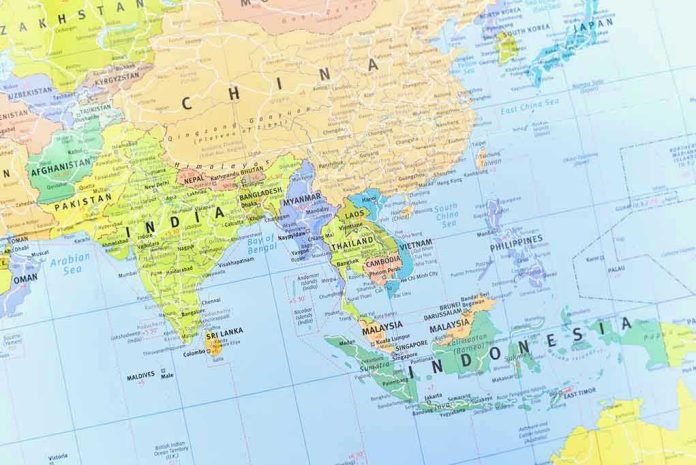
A North Korean man just risked his life to cross the world’s most heavily fortified border—while South Korea’s leadership seems more interested in appeasing Pyongyang than defending its own sovereignty.
At a Glance
- Unarmed North Korean man navigates landmines and military patrols to cross the DMZ into South Korea.
- South Korean government, under President Lee Jae Myung, has recently softened its stance on North Korea, halting anti-regime broadcasts and restricting activists.
- South Korea’s military tracked and detained the man; his motives remain undisclosed, fueling speculation and public debate.
- The crossing comes amid increased North Korean provocations, including trash-filled balloon attacks and past troop incursions.
DMZ Breached: One Man’s Escape and Seoul’s Shrinking Backbone
The Korean Demilitarized Zone (DMZ) is a place the sane avoid, a 2.5-mile-wide strip of barbed wire, landmines, and enough soldiers to fill a stadium on both sides. Yet, on Thursday, an unarmed North Korean man managed to slip through this fortress, dodging death at every step, only to be greeted—not by a government ready to defend its own borders—but by an administration more focused on appeasing the regime that just sent thousands of trash-filled balloons over the wall. The South Korean military, to its credit, tracked the man’s dangerous trek and detained him safely. But the timing couldn’t be more ironic: this happened just as President Lee Jae Myung’s government was dialing back on any activities that might upset Kim Jong Un, including turning off anti-North Korea loudspeakers and gagging activist groups.
Officials have not revealed whether the man intended to defect, a detail that would usually make headlines, but now gets buried under the administration’s new “don’t provoke Pyongyang” doctrine. The American-led United Nations Command was promptly informed, and—surprise—no unusual movement was observed on the North Korean side. Perhaps they’re used to the South looking the other way these days. The only thing more fortified than the DMZ? The wall of silence from South Korean authorities about the motives of the man who risked everything to get out.
From Tension to Timidity: Seoul’s Policy Shift Under Scrutiny
President Lee Jae Myung’s administration has made headlines for its “conciliatory” approach to North Korea. Out went the loudspeakers blasting truth across the border. Out went the leaflets and balloons from activists. The administration’s logic? Tone down what they call “provocation” and maybe Pyongyang will play nice. But reality has a way of mocking naïveté. North Korea’s response has been to escalate, not chill out: they’ve sent thousands of garbage-filled balloons drifting into South Korean towns, launched military incursions across the DMZ, and continued their relentless psychological warfare. Yet, the South Korean government has doubled down on restricting its own citizens, not the aggressors. Critics—many of them rightfully outraged—are calling this out for what it is: a gutless retreat from deterrence and a slap in the face to those who still believe in national sovereignty and family security.
The question on everyone’s mind is simple: will this latest crossing prompt Seoul to rethink its “softer stance,” or will it just fuel more bureaucratic contortions to avoid offending Pyongyang? Meanwhile, the United States and Japan are watching closely, knowing that every concession to a totalitarian neighbor sets a precedent for how freedom-loving nations confront—or capitulate to—tyranny.
The Human Cost and Political Fallout: What’s Next for the Peninsula?
The fate of the North Korean man remains unclear. He’s now in custody, his identity and intentions still under wraps. If history is any guide, he fled a regime that makes daily life a game of survival, only to land in a nation where even basic deterrence is now up for debate. For South Korean border communities, anxiety is rising. Balloon attacks and troop incursions have become the new normal. Activist groups, once seen as defenders of truth, now face government crackdowns for daring to challenge Pyongyang’s lies. The broader public grows more polarized, torn between the hope for peace and the reality of unchecked aggression.
All this while the South Korean government tiptoes around the very regime that pushes the peninsula closer to conflict with every provocation. The defense sector is already calling for more surveillance and security upgrades. Human rights groups are demanding transparency for the man who crossed the DMZ. And the public? They’re left wondering if their leaders are more afraid of offending North Korea than protecting their own people.
Sources:
Fox News: North Korean man crosses DMZ into South Korea as Seoul softens stance on Pyongyang
AP News: North Korean man crosses heavily fortified border into South Korea
Wall Street Journal: North Korean Crosses DMZ Into South Korea as Seoul Softens Stance on Pyongyang







